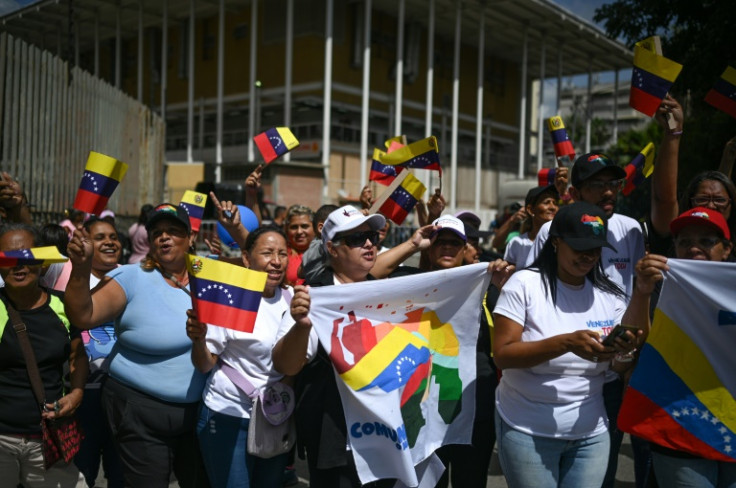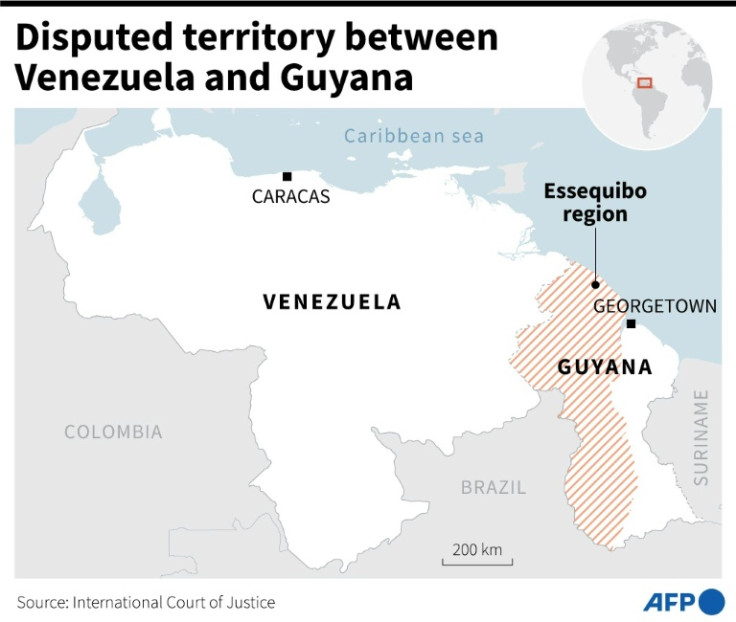
Territorial tensions between Venezuela and Guyana, simmering for years, have erupted over the past few weeks and will reach a boiling point this weekend, as Venezuelans are set to vote on whether to annex the Essequibo territory, a western region of Guyana that is larger than England.
The Essequibo territory borders Venezuela and spans over 62,000 miles. The territorial dispute has a long history dating back to the colonial period, with both countries Venezuela and Guyana having laid claim to the region.
Despite pending litigation at the International Court of Justice (ICJ) over where the two countries' border should lie, Venezuela has decided to ask its citizens' opinion on whether or not it should create a new "state" in Essequibo -- a move Guyana claims would pave the way for its neighbor to "unilaterally and illegally" seize the region.
The Essequibo makes up more than two-thirds of Guyana's territory and has been under its administration for over 100 years.

Documents from the U.S. Department of State show that Great Britain acquired Guyana in 1814 through a treaty with the Netherlands. The treaty, however, did not define the eastern border of Guyana. In order to establish a border, the British commissioned a surveyor to establish a border that later became known as the Schomburgk Line. The Schomburgk Line included the Essequibo territory.
In 1841, Venezuela disputed the border established by Britain and argued that Essequibo belonged to them, as the region was included in the delineation when it gained its independence from Spain.
Later on, the U.S. strengthened Britain's claim to Essequibo. In 1899, the U.S. intervened in the region and awarded the Essequibo territory to the British despite the opposition from Venezuela, according to the U.S. Department of State.
Guyana gained its independence from Britain in 1966, but, according to Axios, during its independence, Britain and Venezuela signed an agreement that the Essequibo territory would remain under Guyana's rule.
The Guyanese government insists on retaining the border determined in 1899 by an arbitration panel, while claiming Venezuela had agreed with the ruling until it changed its mind in 1962.
Caracas, for its part, claims the Essequibo River to the region's east forms a natural border and had been recognized as such from 1777 when the so-called Captaincy General of Venezuela, an administrative district of colonial Spain, was established.
According to Axios, analysts believe that Maduro called the referendum as a show of power, as he is facing a tough challenge from opposition leader María Corina Machado in the 2024 presidential elections.
Guyana's government has taken legal action against the referendum and asked an international court to issue an injunction to delay Sunday's vote while the countries review the legal status of Essequibo.
Venezuela stated that it would continue with the referendum even if the court issued an injunction. The ballot will also include a question on whether Caracas should reject ICJ jurisdiction over the dispute, and whether or not to grant Venezuelan citizenship to the people of the new "Guyana Esequiba State."
According to AFP, Georgetown fears that Venezuela will use a majority "yes" vote as a defense to abandon the ICJ proceedings and resort to unilateral measures, including annexing the entire region by force.
President Nicolas Maduro said Wednesday he expects the vote to yield a "great consensus: to defend Venezuela."
Analysts have also said that the renewed claim could have to do with ExxonMobil's 2015 discovery of crude in Essequibo. Ever since, Guyana became the country with the largest reserves of crude per capita and seen a massive GDP surge. Last month, Guyana announced additional discoveries, taking their estimated reserves to at least 10 billion barrels, more than powerhouses Kuwait and United Arab Emirates. In 2020, Guyana's GDP grew by over 40 percent, while the figure the following year was over 20 percent.
Venezuela has increased its military presence near the border and Guyana has raised the possibility of allowing foreign military bases to be set up in the area. Brazil, which borders with both countries, has intensified its operations as the dispute intensifies.
© 2025 Latin Times. All rights reserved. Do not reproduce without permission.





